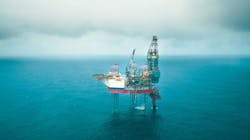From Offshore Oil to Carbon Sink: European partners starting work on planned North Sea CO2 Storage project
A dormant oil field operation in the North Sea is being readied to become what may be one of the world’s most expansive carbon capture and storage projects.
German oil and gas firm Wintershall Dea and chemical firm INEOS Energy are working together as part of the Project Greensand Consortium. The project plans to take as much as eight million metric tons of captured European-generated carbon dioxide per year and store it in a reservoir in the Danish part of the North Sea.
The storage part would begin around 2030. Until then, the companies in the consortium are preparing the site, now known as the depleted Nini West oil field in the Danish North Sea.
Beginning this spring, some 15,000 tons of captured carbon emissions from a Belgian industrial plant will begin storage there as the demonstration project.
“Project Greensand marks a leap forward for the development of a Europe-wide CCS infrastructure and therefore for climate protection,” Mario Mehren, CEO of Wintershall Dea, said in a statement. “We are showing that it is possible to capture, transport and store CO2 safely and reliably across national borders, and the CCS technology will be able to contribute to a decarbonized tomorrow in the near future.”
Carbon Capture around the World covered by EnergyTech
U.S. Steel pursuing Carbon Capture at largest plant Gary Works
GE Gas Power partnering with South Korean firms to explore CCUS at Asian Gas-fired plant
Subscribe to our free newsletters for Everyday Insights into the C&I Energy Transition
In addition to the leaders from the consortium partners, Wednesday’s ceremony in Denmark was attended by the nation’s Crown Prince Frederik. The Danish government is contributing 26 million Euros in public funding for the project.
In addition to INEOS, the Project Greensand consortium includes several startups, the Geological Survey of Denmark and Greenland and other institutes. Once the efforts mets it initial goal of storing 8 million metric tons of CO2 per year, that would represent a majority of German’s emissions expected at that point early in the next decade.
Concurrently, Wintershall Dea has signed a joint cooperation agreement with Belgian transmission system operator Fluxys. Under the deal, Fluxys would help develop a cross-border CO2 pipeline network connecting southern Germany and Belgium.
The planned pipeline would move captured and collected carbon emissions from industrial clusters to Zeebrugge on the Belgian North Sea and ultimately to the project and reservoir region where Wintershall Dea is involved.
-- -- --
(Rod Walton, senior editor for EnergyTech, is a 15-year veteran of covering the energy industry both as a newspaper and trade journalist. He can be reached at [email protected]).
Follow us on Twitter @EnergyTechNews_ and @rodwaltonelp and on LinkedIn
About the Author
Rod Walton, EnergyTech Managing Editor
Managing Editor
For EnergyTech editorial inquiries, please contact Managing Editor Rod Walton at [email protected].
Rod Walton has spent 17 years covering the energy industry as a newspaper and trade journalist. He formerly was energy writer and business editor at the Tulsa World. Later, he spent six years covering the electricity power sector for Pennwell and Clarion Events. He joined Endeavor and EnergyTech in November 2021.
Walton earned his Bachelors degree in journalism from the University of Oklahoma. His career stops include the Moore American, Bartlesville Examiner-Enterprise, Wagoner Tribune and Tulsa World.
EnergyTech is focused on the mission critical and large-scale energy users and their sustainability and resiliency goals. These include the commercial and industrial sectors, as well as the military, universities, data centers and microgrids. The C&I sectors together account for close to 30 percent of greenhouse gas emissions in the U.S.
He was named Managing Editor for Microgrid Knowledge and EnergyTech starting July 1, 2023
Many large-scale energy users such as Fortune 500 companies, and mission-critical users such as military bases, universities, healthcare facilities, public safety and data centers, shifting their energy priorities to reach net-zero carbon goals within the coming decades. These include plans for renewable energy power purchase agreements, but also on-site resiliency projects such as microgrids, combined heat and power, rooftop solar, energy storage, digitalization and building efficiency upgrades.

